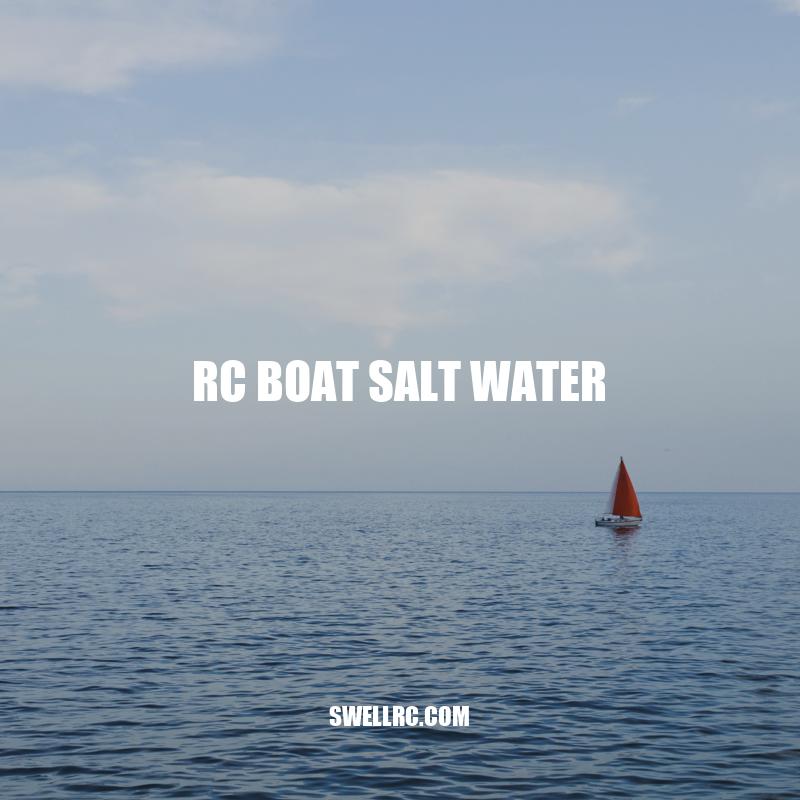Mastering Saltwater RC Boats: Tips, Maintenance, and Popular Models
RC boats are miniature boats that are operated remotely using a control system. Remote control boats are popular recreational vehicles that allow their users to enjoy the thrill of boating while remaining on the shore. They are designed and built to operate on various kinds of water bodies such as lakes, rivers, and even swimming pools. RC boats can be categorized into two types depending on the type of water they are designed to navigate: freshwater and saltwater. While freshwater RC boats operate perfectly fine in lakes and calm rivers, the saltwater environment can cause severe damages to their internal components. This article takes an in-depth look at RC boats for salt water use, discussing the benefits of using RC boats in saltwater, materials required for saltwater RC boats, maintenance tips, popular models, and best practices when operating an RC boat in saltwater.
Benefits of using RC boats in saltwater
Using an RC boat in saltwater comes with unique benefits that are not offered in freshwater. These include:
- Durability: RC boats designed for use in saltwater have enhanced durability and can withstand the harsh conditions of saltwater better than freshwater boats.
- Waterproofing: Saltwater RC boats are waterproofed, ensuring that their internal electrical and mechanical components are protected from damage caused by water seepage.
- Realism: Using RC boats in saltwater provides a more realistic experience since the saltwater environment mimics real boating conditions.
When considering purchasing an RC boat for saltwater use, it is important to look for models that are designed for marine environments. Some popular models of saltwater RC boats include the Pro Boat Blackjack 24-inch Brushless Catamaran, Traxxas DCB M41 Widebody, and the Venom P1 Powerboat. Additionally, there are several online resources available for those interested in purchasing saltwater RC boats, such as Amazon, Horizon Hobby, and RC Planet.
Can I use a RC boat in salt water?
Yes, you can use a RC boat in salt water but it’s important to take some precautions to avoid damaging your boat.
- Make sure to get a RC boat that’s specifically designed for saltwater use
- Before using your boat in salt water, rinse it thoroughly with fresh water to remove any salt buildup
- Apply a corrosion-resistant product to the boat’s metal parts to prevent rust and corrosion
- Use a waterproof sealant on any openings or joints in the boat to prevent water from entering and damaging the electronics
If you’re looking to buy a RC boat for salt water use, make sure to do your research and choose a reputable brand that has a proven track record of durability and performance in these conditions. There are many websites that offer a variety of options, such as Horizon Hobby, RC Boat Magazine, and Tower Hobbies.
Materials required for saltwater RC boats
When it comes to RC boats for saltwater use, certain materials are necessary to ensure the boat can handle the harsh marine environment. These materials include:
- Corrosion-resistant components: Saltwater is corrosive, and thus the use of corrosion-resistant components is crucial to prevent damage to the boat.
- Waterproof servos: Servos are responsible for controlling the boat’s steering and speed, and saltwater can damage them. Waterproof servos prevent this damage and ensure reliable operation.
- Stainless steel screws: Regular screws can rust and deteriorate in saltwater. The use of stainless steel screws prevents this and increases the lifespan of the boat.
It is recommended to purchase a saltwater RC boat that comes equipped with corrosion-resistant coatings and stainless steel hardware. When purchasing components for a DIY saltwater RC boat project, it is important to ensure that they are designed for use in marine environments.
Online retailers such as Amazon, Tower Hobbies, and RC Planet offer a variety of saltwater RC boat components and kits. When selecting materials, also consider the type of boat being built, as different types of boats require different components and materials.
What Materials Are Needed for a Boat?
Building a boat requires a variety of materials depending on the type, size, and purpose of the vessel. Here are some of the most commonly used materials:
- Wood: It is the most common material for building boats. Marine plywood, cedar, mahogany, and teak are some of the popular choices.
- Fiberglass: This material is lightweight and easy to maintain, making it a popular choice for recreational boats and yachts.
- Aluminum: It is more durable than fiberglass and used for commercial and larger boats.
- Steel: It is strong but heavy and requires regular maintenance to prevent rust.
- Carbon Fiber: It is the strongest and lightest material for building boats and used for high-performance vessels.
If you are planning to build a boat, you can find a variety of materials and supplies from specialized boating suppliers such as West Marine, Jamestown Distributors, and Defender.
Maintenance of saltwater RC boats
Saltwater is corrosive and can damage an RC boat‘s components if not properly maintained. Here are some tips for maintaining a saltwater RC boat:
- Rinse with fresh water after use: After each use, rinse the boat and components with freshwater to remove any saltwater residue.
- Dry thoroughly: Allow the boat and components to dry completely before storing to prevent corrosion and mold growth.
- Store properly: Store the boat in a dry, cool place to prevent damage from humidity.
- Check for corrosion: Regularly inspect the boat and components for signs of corrosion, and replace any damaged parts as necessary.
- Avoid prolonged exposure: Try to avoid prolonged exposure to saltwater, as this can accelerate corrosion and damage components.
By following these maintenance tips, the lifespan and reliability of a saltwater RC boat can be greatly increased. Some popular products for maintaining RC boats include:
- Corrosion X: Designed to prevent corrosion, this product can be used on a variety of metal components, including engines, plugs, and propellers.
- WD-40 Specialist Marine Spray: This spray protects against rust and corrosion and can be used on both metal and non-metal components.
- Grease: Applying grease to moving parts such as bearings and shafts can prevent damage from saltwater and prolong the lifespan of these components.
These products can be found at marine and hobby stores, as well as online retailers such as Amazon and eBay.
How do you clean an RC boat after salt water?
Cleaning an RC boat after salt water is crucial to keep it in good working condition. Here are a few steps to help:
| Materials Needed: | Steps: |
|---|---|
| Warm water | 1. Rinse the boat with warm water to remove any excess salt or debris. |
| Dish soap | 2. Add a few drops of dish soap to a bucket of water. |
| Soft-bristled brush | 3. Using a soft-bristled brush, gently scrub the boat with the soapy water. |
| Towel | 4. Rinse the boat with warm water once more and dry it with a towel. |
It’s important to note that some RC boat models may require specific cleaning instructions, so always refer to your user manual first.
There are also cleaning products available in the market that are specifically designed for RC boats and can make cleaning easier. Check out your local hobby store or online retailer for options.
Overall, proper cleaning and maintenance can help extend the life of your RC boat and keep it running smoothly.
Popular models of saltwater RC boats
There are many RC boats available on the market designed for saltwater use. Here are some of the most popular models:
- Traxxas Spartan: This racing-style boat is equipped with a water-cooled, brushless motor and can reach speeds of up to 50mph.
- Aquacraft UL-1 Superior: The UL-1 Superior features a self-righting hull, water-cooled motor, and adjustable aluminum propeller.
- Proboat Blackjack: The Blackjack is a sleek, speedboat-style model equipped with a brushless motor and can reach speeds of up to 30mph.
- FT012: This budget-friendly model is equipped with a water-cooled motor and can reach speeds of up to 25mph.
These models vary in price and capabilities, so it’s important to consider your needs and budget when selecting a saltwater RC boat. Many popular models can be found on websites such as Horizon Hobby, Tower Hobbies, and Amazon.
Can I use RC boat in saltwater?
Yes, you can use RC boats in saltwater but not all RC boats are designed for saltwater use. It is important to check the product specifications before using it in saltwater.
Saltwater can corrode and damage the electronics and motor of some RC boats. To prevent this from happening, look for RC boats that are specifically designed for saltwater use or have water-resistant electronics and coatings.
Some popular saltwater RC boats include the Traxxas Spartan, Pro Boat Blackjack 24, and Aquacraft UL-1 Superior. These boats have features such as waterproof electronics, sealed battery compartments, and rust-resistant materials.
When using RC boats in saltwater, it is important to clean and rinse them thoroughly after each use to prevent salt build-up and corrosion. Regular maintenance and cleaning can extend the life of your RC boat and ensure smooth operation.
For more information on RC boats and their use in saltwater, check out websites like RC Universe and RC Groups, which offer forums, reviews, and discussions on the topic.
Tips for Operating a Saltwater RC Boat
Operating an RC boat in saltwater can be challenging, but with these tips, you can make sure your experience is a success:
- Use a waterproof receiver: Make sure your RC boat’s receiver is completely waterproof to prevent failure due to water damage.
- Add flotation devices: Adding foam or inflatable flotation devices to your RC boat will keep it from sinking if it capsizes.
- Stay clear of obstructions: Avoid shallow areas, rocky outcroppings, and other obstacles that could damage your boat.
- Check weather conditions: Saltwater can quickly become choppy, so make sure to check weather conditions before operating your RC boat.
- Protect your boat: After use, rinse your boat with freshwater and lubricate moving parts to protect against corrosion and damage.
Many manufacturers offer additional tips for operating their specific models. It is recommended to consult the manual for your particular RC boat to ensure optimal performance.
Can you run RC boat in salt water?
Yes, you can run RC boats in salt water, but it is important to take into consideration the type of boat and the materials used to construct it.
There are two main types of RC boats, those meant for saltwater use and those meant for freshwater use. Saltwater RC boats are built with materials that are corrosion-resistant and able to withstand the harsh environment of saltwater.
However, if you have a freshwater RC boat and you want to run it in salt water, you need to take extra precautions to avoid damaging the boat. Here are some tips:
- Before running your boat in salt water, rinse it thoroughly with fresh water.
- Apply a corrosion protection spray to the boat’s metal parts.
- Use a waterproof sealant on any areas that could potentially let in water.
- After use, rinse the boat thoroughly with fresh water and dry it completely.
Overall, if you have a saltwater RC boat, you can enjoy running it in saltwater without worrying about damage. If you have a freshwater RC boat and want to run it in saltwater, take the necessary precautions to protect your boat.
If you’re interested in purchasing an RC boat specifically designed for saltwater use, check out websites such as Horizon Hobby or RC Boat Magazine for a wide selection of options.
Conclusion
Using an RC boat in saltwater can be a fun and rewarding experience for hobbyists who enjoy a challenge. With the right materials, maintenance, and knowledge of best practices for operating in saltwater environments, you can ensure that your RC boat remains durable and reliable for years to come. Be sure to follow manufacturer recommendations for maintenance and operation to maximize your enjoyment of your RC boat.
If you’re looking for additional resources, there are many online forums and websites dedicated to RC boat enthusiasts. These resources can provide valuable tips and advice for operating and maintaining your RC boat in saltwater. Additionally, many manufacturers offer customer support and online communities where you can connect with other RC boat hobbyists.
Overall, using an RC boat in saltwater can provide a unique and exciting hobby experience that is both challenging and enjoyable. Whether you’re a seasoned RC boat enthusiast or a newcomer, there are many resources available to help you get started and succeed in the world of saltwater RC boating.



